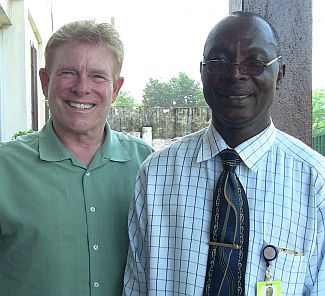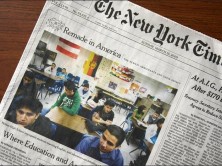
Interim dean of UNT’s Mayborn School of Journalism, Mitchell Land, pictured above with, presumably, a local journalist, just returned from an 11-day trip to train Liberian reporters. (Credit: Civic & Citizen Journalism Interest Group blog post titled, “It is most appropriate for the U.S. to train journalists in foreign countries”).
iMediaEthics wrote in late September about Mitchell Land, University of North Texas, interim dean for the Mayborn School of Journalism, who went to Liberia to train journalists prior to the country’s Oct. 11 general elections.
The US State Department’s African Affairs bureau director Bill Strassberger had confirmed in a Sept. 30 e-mail to iMediaEthics that the U.S. government paid for Land’s travels to train the Liberian journalists – and that it’s not unusual for the U.S. government to do so.
“It is important to know that this is a regular practice—the Public Diplomacy programs at U.S. embassies regularly provide such training. Our policy is to promote free, fair, and transparent elections, and an important part of that is ensuring that the media is prepared to meet its responsibilities,” Strassberger explained.
iMediaEthics had some questions about Land’s workshops – which journalists attended, and what media ethics issues were covered, for example. Land addressed our questions via e-mail.
Land wrote via e-mail that he wasn’t sure but didn’t think that the journalists who attended his workshops had to pay. “I believe all reporters and editors were invited to attend the workshops, from newspapers, TV, radio and other. I think this was on a voluntary basis. The workshops were not open to the general public,” Land explained. He also detailed in this blog that about 30 editors and 40 reporters attended his workshops and that he “spent three days a week with reporters.”
We asked if the government gave him any guidelines in training the journalists. He told us that was asked to spend about 30 percent of his time training advanced reporting skills and feature writing, 20 percent on ethics and the law in photojournalism, and 50 percent on covering political campaigns.
Land mentioned in a Q & A about his trip on this blog that fact-checking, attribution and proper source identification were some ethical issues that were troublesome for Liberian journalists. iMediaEthics asked what other ethical issues he focused on in his training of the Liberian journalists, to which he responded conflicts of interest and propaganda were other major issues.
“Conflicts of interest such as accepting favors or ‘rides’ from political candidates to campaign events; doing work on the side for a politician while still assigned as a reporter for a media entity; promoting the political agenda and goals of candidates; working as a ‘stenographer’ of speeches, interviews and news releases rather than holding folks accountable to a citizens’ agenda,” were some media ethics issues he taught in Liberia.
Land also discussed his trip in a question-and-answer blog post with fellow UNT journalism professor Nikhil Moro. Moro disclosed on the blog that “Land is my colleague at the School; although I spared no question, this Q&A should not be considered an exercise in journalism. I report it on his request and because it engages important issues such as American journalistic intervention.”
Land told Moro that it’s OK for the U.S. government to provide training to journalists in other countries because “The U.S. State Department’s public diplomacy section is tasked with building capacity—which includes providing training for journalists—in every country where the U.S. has an embassy. I provide the material as I see fit with no interference from the U.S. government.”
Upon Land’s suggestion, we have written to Steven Lauterbach of the public diplomacy section of the U.S. Embassy in Morovia for confirmation that Liberian journalists didn’t have to pay for training and that all reporters and editors were invited – not just certain news organizations – and will update with any response.
Lauterbach’s e-mail sent an auto-reply that he will be out of the office until Oct. 25, so we redirected our questions to Jody Rose Platt, as instructed.






